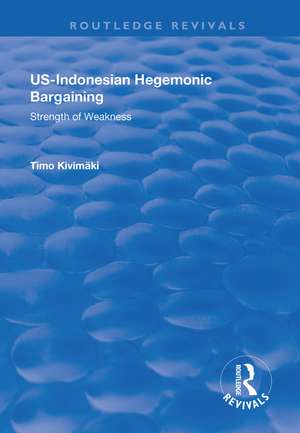US-Indonesian Hegemonic Bargaining: Strength of Weakness: Routledge Revivals
Autor Timo Kivimäkien Limba Engleză Paperback – 31 oct 2019
| Toate formatele și edițiile | Preț | Express |
|---|---|---|
| Paperback (1) | 243.53 lei 6-8 săpt. | |
| Taylor & Francis – 31 oct 2019 | 243.53 lei 6-8 săpt. | |
| Hardback (1) | 485.78 lei 6-8 săpt. | |
| Taylor & Francis – 13 dec 2017 | 485.78 lei 6-8 săpt. |
Din seria Routledge Revivals
- 9%
 Preț: 801.69 lei
Preț: 801.69 lei - 8%
 Preț: 432.15 lei
Preț: 432.15 lei -
 Preț: 153.81 lei
Preț: 153.81 lei -
 Preț: 230.80 lei
Preț: 230.80 lei -
 Preț: 294.72 lei
Preț: 294.72 lei -
 Preț: 258.72 lei
Preț: 258.72 lei - 9%
 Preț: 764.34 lei
Preț: 764.34 lei - 9%
 Preț: 903.41 lei
Preț: 903.41 lei -
 Preț: 296.10 lei
Preț: 296.10 lei -
 Preț: 342.36 lei
Preț: 342.36 lei - 9%
 Preț: 606.35 lei
Preț: 606.35 lei -
 Preț: 317.54 lei
Preț: 317.54 lei - 9%
 Preț: 764.28 lei
Preț: 764.28 lei -
 Preț: 257.00 lei
Preț: 257.00 lei -
 Preț: 238.40 lei
Preț: 238.40 lei -
 Preț: 259.47 lei
Preț: 259.47 lei - 9%
 Preț: 903.80 lei
Preț: 903.80 lei -
 Preț: 326.26 lei
Preț: 326.26 lei -
 Preț: 258.66 lei
Preț: 258.66 lei -
 Preț: 294.97 lei
Preț: 294.97 lei -
 Preț: 308.89 lei
Preț: 308.89 lei -
 Preț: 199.85 lei
Preț: 199.85 lei -
 Preț: 347.49 lei
Preț: 347.49 lei -
 Preț: 295.04 lei
Preț: 295.04 lei -
 Preț: 389.39 lei
Preț: 389.39 lei -
 Preț: 257.00 lei
Preț: 257.00 lei -
 Preț: 343.21 lei
Preț: 343.21 lei - 9%
 Preț: 640.90 lei
Preț: 640.90 lei - 9%
 Preț: 619.48 lei
Preț: 619.48 lei -
 Preț: 228.88 lei
Preț: 228.88 lei -
 Preț: 257.67 lei
Preț: 257.67 lei -
 Preț: 245.10 lei
Preț: 245.10 lei -
 Preț: 258.52 lei
Preț: 258.52 lei -
 Preț: 258.72 lei
Preț: 258.72 lei -
 Preț: 368.93 lei
Preț: 368.93 lei -
 Preț: 246.37 lei
Preț: 246.37 lei - 9%
 Preț: 832.07 lei
Preț: 832.07 lei -
 Preț: 258.66 lei
Preț: 258.66 lei -
 Preț: 286.98 lei
Preț: 286.98 lei - 18%
 Preț: 695.85 lei
Preț: 695.85 lei - 9%
 Preț: 934.94 lei
Preț: 934.94 lei - 5%
 Preț: 231.22 lei
Preț: 231.22 lei -
 Preț: 267.15 lei
Preț: 267.15 lei -
 Preț: 200.66 lei
Preț: 200.66 lei - 9%
 Preț: 638.61 lei
Preț: 638.61 lei -
 Preț: 259.68 lei
Preț: 259.68 lei - 9%
 Preț: 1038.45 lei
Preț: 1038.45 lei -
 Preț: 389.43 lei
Preț: 389.43 lei -
 Preț: 302.13 lei
Preț: 302.13 lei -
 Preț: 302.25 lei
Preț: 302.25 lei
Preț: 243.53 lei
Preț vechi: 290.03 lei
-16% Nou
Puncte Express: 365
Preț estimativ în valută:
46.60€ • 48.78$ • 38.56£
46.60€ • 48.78$ • 38.56£
Carte tipărită la comandă
Livrare economică 05-19 aprilie
Preluare comenzi: 021 569.72.76
Specificații
ISBN-13: 9781138710696
ISBN-10: 1138710695
Pagini: 308
Dimensiuni: 152 x 219 mm
Greutate: 0.57 kg
Ediția:1
Editura: Taylor & Francis
Colecția Routledge
Seria Routledge Revivals
Locul publicării:Oxford, United Kingdom
ISBN-10: 1138710695
Pagini: 308
Dimensiuni: 152 x 219 mm
Greutate: 0.57 kg
Ediția:1
Editura: Taylor & Francis
Colecția Routledge
Seria Routledge Revivals
Locul publicării:Oxford, United Kingdom
Cuprins
Contents: Introduction; The negotiations; Research design; Bargaining during hegemonic transition; Bargaining during integral hegemony; Emerging challenge to the hegemonic order; Second phase of hegemonic decline; Bargaining during minimal hegemony; Post-hegemonic bargaining; Conclusions: strength of weakness; References; Annexes; Index.
Notă biografică
Dr. Timo Kivimäki has been professor of the University of Helsinki, Copenhagen and Lapland, and the Director of the Nordic Institute of Asian Studies (University of Copenhagen) and the Institute of Asian Studies (University of Helsinki). He has also been a frequent adviser to the Finnish, Danish, Dutch, Russian, Indonesian and Swedish governments, as well as to several UN and EU organizations on conflict and peace negotiation. Dr. Kivimäki’s latest book, Can Peace Research Make Peace? was published by Ashgate in 2012.
Recenzii
'Kivimäki's study is the result of meticulous research into all available public and private sources, combined into an illuminating analysis of asymmetric bargaining that makes an important contribution to foreign policy and negotiation literature. In addition, it is an exciting story.' Dr I. William Zartman, Johns Hopkins University, USA '...offers an in-depth analysis of the strengths of and limits on Indonesian bargaining in its bilateral relations with the USA...rich in detail and reflects very considerable research.' Journal of Peace Research 'The author should be commended for intensive research and extensive interviews with important players in the "bargaining" process.' USI Journal
Descriere
Title first published in 2003. Following the terrorist attacks of September 11, 2001 and October 12, 2002 in the United States and on Bali, we may be witnessing the most sweeping shift in US foreign policy since the beginning of the cold war. America is again committed to leading the world in a battle against a global enemy. The US relationship with Indonesia - the country with the world’s largest Islamic population - could prove to be of decisive importance for the success of its new global mission. Timo Kivimäki’s analysis of the dynamics and background of the US-Indonesian relationship will be essential reading for all concerned with American Foreign Policy, Asian studies, peace studies and conflict resolution and negotiation.
